QuestionHi there, I am wondering if you can give me some advice. We have a little rat who is about 1 year old. She is the love of my 5 year old daughters life which makes this problem even more horrible. Angelina was looking very wet around the genital area for a few days and then I noticed a really BAD smell. She also has a swollen belly. She is still eating and I am making sure that she gets a syringe of water a day.She has lost a lot of weight (skin and bones) even though she was always a bit smaller than our other female. She still loves her pats although we have not been handling her and have been keeping her quiet. From my description on the phone to our vet, she said it sounds very much like an infection of the uterus and she has prescribed Baytril 0.1 ml twice a day. She has been on this for 2 days now. I feel terrible just looking at her. The vet seems to know abit about rats and she said that she would be happy to spay her for me. Is this the right thing to do, should I get her put to sleep or not? How long can a rat go on like this, it would be at least a week, maybe 10 days (as she is a freerange rattie too) since I first noticed it and I contacted the vet 2 days ago hence she has been on meds for two days.What do I do? We love this little girl rattie but dont want her to suffer unduly. Thanks for your time, cheers for now, Steph.
AnswerHi Stephanie
By all means, spay her and don't wait much longer. I will never own another female rat again unless I spay them.
She probably has either mycoplasmosis of the uterus or pyometra, which is pretty ugly. Both can be treated but the problem with remaining intact is that as she ages and hits menopause age, chances of her getting mammary tumors from high estrogen levels are very high, as it is with all female rats. There is no need to put her down even if you do opt to pass on spaying her because she will get better, it just takes a bit of time. Usually about a full week for her to really get back to her old self. She has more time ahead of her yet, perhaps another 2 years or more, so putting her down for a treatable illness is not advised.
Again I would spay her straight away, but be sure to find out what her protocol is for spaying. Be sure she is indeed experienced with rats. Is she an exotic vet by chance? There is a difference between exotic vets and vets that hold a special interest in rats, but by no means does that make her less than adequate in treating rats, it simply means she did not continue her education for the specified two years or so and she did not pass specialty boards. There are good vets that know alot about rats out there but there are also vets that only "think" they can handle it. Be sure to ask how many successful spays she has had with females. Ask her what type of anesthesia she will use, and the answer should be either isoflurane or sevoflurane. I prefer sevoflurane and chances are if she is an exotic vet, she uses it. Isoflurane is fine too, though so no worries. Find out about pain control. Spaying is invasive and she needs NARCOTIC pain meds, not something like metacam which is simply no better than motrin or advil. Find out about stitches. She should have internal and external stitches. I prefer staples for the outer ones but many vets do not use them. The surgical glue is worthless UNLESS it is used along with some type of sutures.
Also, ask how long she will be kept there. She SHOULD Be kept overnight and in fact 48 hours is ideal. So many vets send them home too soon, the same day, and they are still all groggy and stoned out of their minds from the anesthesia, and this is unacceptable. Also, find out if they use a heated surgical table and what methods are used to warm her body up after surgery. This is very important. Rats drop their body temp during surgery to a very dangerous low and it is critical they are kept on a heated surgical table during surgery and especially after surgery as well, at least for 8 hours or longer and I prefer 12 or more hours.
Not every vet will do things the same way, but most of what I am suggesting is normal protocol and important to find out the way she does things and allow her to explain WHY she doesn't do certain things first before worrying if she disagrees with me. I am NOT a vet, although I work with many vets including a highly noted exotic vet so I am pretty well versed on the normal protocol for specific procedures. Failure to follow most of what I said above with the exception of the stitches and keeping her over night is very important. No other anesthesia should be used for rats so if she uses something else, do not allow her to do the surgery.
Oh yeah and also, antibiotics after the spay are vital with her history of infection.
I sure hope I helped and didn't make you worry about spaying. This will save her life now and in the future. I have had my own rats develop mammary tumors and had them removed and they grew back and if they were spayed, chances are greatly reduced that she would ever develop any more tumors again once she is spayed. Normally spaying is done as young as 4 months old to prevent tumor growth and infection so it is indeed safe and something that is practiced normally on females to help prolong their life.
Anyhow, if for whatever reason you prefer to find a new vet I can help you if I know where your located.
Best regards
Sandra Todd

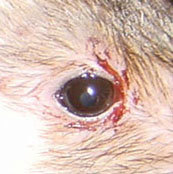 Bloody eyes in my pet rat...
QuestionMy cousins pet rat is about three years old and
Bloody eyes in my pet rat...
QuestionMy cousins pet rat is about three years old and
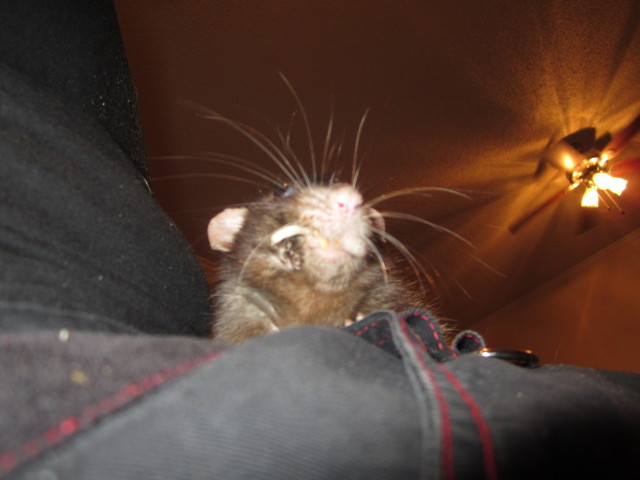 Overgrown Teeth
QuestionDarkWings teeth
QUESTION: My Dumbo Rat,
Overgrown Teeth
QuestionDarkWings teeth
QUESTION: My Dumbo Rat,
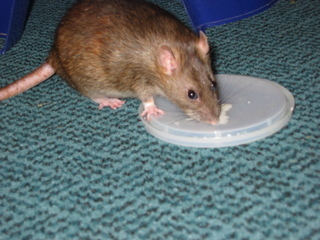 smudge
QuestionQUESTION: He is so cute!!! He looks alot like J
smudge
QuestionQUESTION: He is so cute!!! He looks alot like J
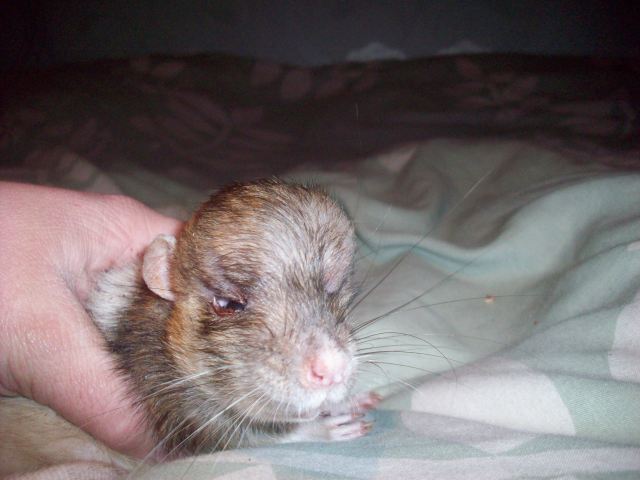 my rat bigboy
QuestionQUESTION: hi my name is stuart i have a male ra
my rat bigboy
QuestionQUESTION: hi my name is stuart i have a male ra
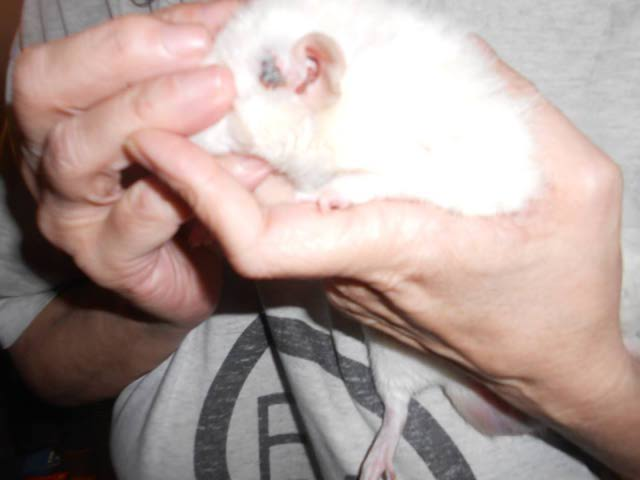 bump between eye and ear
Question
Pete or Repete
My 17 month old rat has
bump between eye and ear
Question
Pete or Repete
My 17 month old rat has